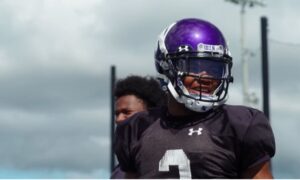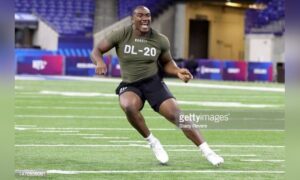While some may see the future of college sports as on the brink of swift, major, inevitable change, the reality is much more mundane—and litigious. The NCAA recently correcting an absurd policy regarding food and snacks provided to student-athletes surely does not amount to much in the long run, for example.
The football athletes at Northwestern University had the opportunity yesterday, after an earlier ruling by a regional board stated that they are employees of the university, to vote for whether or not they wished to form a union.
So why is there no news on the results today? Donald Yee wrote yesterday, “in the end, it doesn’t matter if the Northwestern players vote ‘yes’ or no’”. It certainly won’t matter for a while, as the votes “will be impounded at the National Labor Relations Board office in Chicago, unlikely to even be counted for months”.
So we won’t even know whether or not the Wildcats football team has elected to unionize for months, and in the meantime, the university will have its appeal of the original ruling heard by the NLRB, which is another process that will take months.
This is the form that change will likely take, a long, drawn out process in the courts and elsewhere with the college boards fighting tooth and nail every step of the way. And it only serves to overshadow the broader issues.
Make, no mistake, the universities are very much in the billion-dollar “business of football”, as the expression goes. That is why Northwestern “officials acted more like executives in a commercial business, mounting a well-coordinated ‘vote no’ campaign and using tactics designed to scare their players”.
Change is needed, and likely coming, but as Yee writes, the matter raises greater concerns “about the university model of education, not athletics”. Many players, for example, particularly those faithfully pursuing their education, find the demands of their athletic program too great to also successfully navigate their studies:
Ex-player Michael Odom, who walked onto the team last season but quit because the time demands were interfering with his academic work, said he believed the formation of union would be voted down because players had been “talked out of” yes votes by Northwestern officials and former players who had framed it as a betrayal of the Wildcats football family.
Yee also argues that many of the university’s, and NCAA’s, tactics have worked to reinforce the “business of football” notion. The threat of bringing in replacement players for scholarship players who choose to strike implies that students can ‘lose their job’.
“Learned adults at Northwestern are supposed to be leading and educating, not scaring and obfuscating”, he writes. “This is the real tragedy of the big business of major college sports”.
The universities around the country are currently making demands of their student-athletes that would be fit for employees. If they want to uphold their ideal of the student-athlete, then they need to start allowing them to focus on being students, rather than offering freebie non-attendance courses and making a mockery of the concept of academic eligibility. Otherwise, make them employees and let them focus on what the majority of them are there for: pursuing an athletic career.







